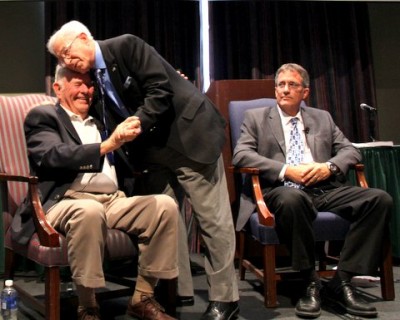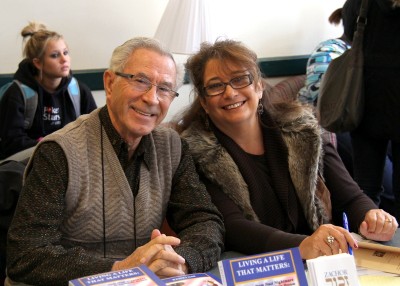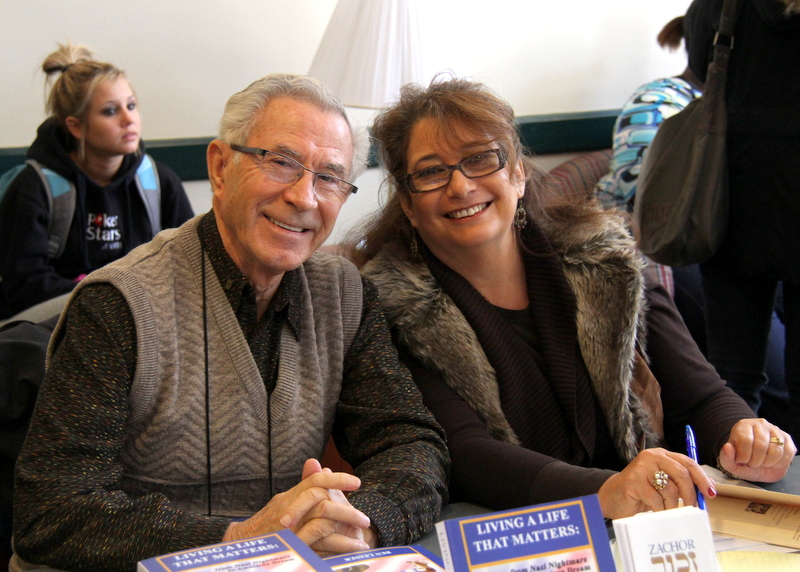
April, 1944. Just weeks after the Nazis invaded Hungary, 15-year-old Ben Lesser and his family were forced to Munkachevo, Hungary. After months of avoiding the Germans in Hungary, the town was liquidated.
Lesser and his family were marched to a brick factory shadowed by freight trains. In early May, they were loaded into cattle cars. A few days later, the train came to a stop at Auschwitz-Birkenau.
“We saw the gate that said ‘Arbeit Macht Frei.’ You know, ‘work makes freedom.’” Lesser said. “Most of the people looking out of that little window in the cattle cars were sort of pleased. ‘Look! It’s true. It’s a camp. See the barracks.’ We had no idea what it really was.”
The doors opened. Jewish inmates and SS guards started yelling for women and children to the left, men to the right.
“That was the last time I saw my little brother and my sister. They went to the right. We didn’t have a chance to say goodbye. We were just torn and ripped apart,” he said.
Lesser, his cousin, and uncle, were sent to a labor camp a few weeks later in Durnhau, where he was assigned to work at a rock quarry.
“It was very difficult because they wouldn’t let us rest. You either were carrying the rocks to the mining carts, transporting them, or using a sledge hammer to break them up. If you rested for a minute, you were clubbed or you were shot,” Lesser said. “But, for months, we were surviving.”
Despite the work and senseless beatings, Lesser and his cousin clung to life. In February, 1945, as little more than skin and bones, they survived the death march from Durnhau to Buchenwald.
After a night in Buchenwald, they were stuffed back into a cattle car with one loaf of bread between them. The train went from station to station, camp to camp for weeks as Jews died from starvation and horrific conditions. In late April, the train stopped in Dachau.
“I could barely stand. I believe the only reason they didn’t kill me was because the crematoriums ran out of coal,” he said. “They just let nature run its course. They didn’t feed us or anything. For three days, we just laid there until we were liberated.”
On April 29, 1945, Dachau was liberated by the Americans, freeing more than 30,000 prisoners. For Lesser, it was the start of a new life. Two years later, he immigrated to the United States.
Like many survivors, remembering the Holocaust came with a wide variety of emotions. He didn’t speak to his family about the events only saying that he would tell them later.
When one of his grandchildren was in the fifth grade, Lesser was asked to speak to the elementary school class about the Holocaust. He had never spoken about the experiences, but decided to speak to the class.
“It’s so important to get across to young kids that the Nazis didn’t start with killing. It all started with hate,” Lesser said.
From then on, Lesser has been taking his story across the country speaking to synagogues, churches, schools, communities and to anyone who would listen. Those presentations led to the establishment in 2009 of the Zachor Holocaust Remembrance Foundation.
The Foundation’s mission is to pass on the memory and history of the Holocaust in the hopes of preventing the world from repeating its mistakes due to prejudice, intolerance, and ignorance. Lesser’s speeches have helped to further the foundation’s goal. He has been an integral part of the Middle Tennessee State University Holocaust Studies Program and Jewish featured at MTSU’s Holocaust Conference in 2011 and 2013.
“I am honored to have survivors such as Ben Lesser speak at MTSU…. Ben in particular made himself available throughout the conference to talk one-on-one with students, to sign his book, and, with his daughter, to participate in the mission of his Zachor Foundation,” said Elyce Helford, Ph.D., Director of the Jewish and Holocaust Studies Minor and professor of English at MTSU.
MTSU’s Holocaust Conference has grown exponentially since its inception in 1992. The conference brought together Lesser, a survivor of Dachau, and local veteran Jerry Gentry, who helped to liberate Dachau.
The collaboration of the Zachor Foundation and MTSU’s Holocaust Studies program brings these testimonies to the entire community. The experiences leave a lasting impression on attendees.
“When the Liberators explain how they felt when they marched into the camp and survivors explain how they lived in the camp, often with tears in their eyes, the students respond with either attentive silence or by sucking and holding in their breath as the old soldiers and survivors describe their experiences,” said Dr. Nancy Rupprecht, Chair of the MTSU Holocaust Studies Program.
“We are trying to make a footprint as quickly as possible to make sure that every survivor’s testimony is told and retold. People need to be educated so that it can never happen again,” said Gail Lesser-Gerber, Ben’s daughter and the foundation’s director.

The foundation hopes to be an outlet and a resource for survivors, while providing future generations with access to testimonies, images and knowledge of the Holocaust.
“One day our hope is that you are going to retell these testimonies to somebody else. After (the survivors) are gone, we need you to continue telling their experiences,” Lesser-Gerber said.
Since then, the Zachor Holocaust Remembrance Foundation has grown over the last five years and is now focusing on the newest project, the “I Shout Out” project.
The “I Shout Out” Project has moved to the forefront of the foundation’s effort. The project’s goal is to get six million “shout-outs” pledging to take a stand against anti-Semitism, racism, bullying, intolerance and discrimination, while creating an atmosphere of equality.
On the Foundation’s website, people can fill out a form for their own individual “shout-out” and join the list of others who have made similar pledges. The project hopes to get “six million voices to speak for the six million that were silenced.”
“We just want to help bring more awareness. We want visitors to be able to see people’s faces and be able to share in the same cause,” Lesser-Gerber said of the Project. “We want people to know that their voices can be heard. They can stand up for things they believe in and see others that believe in the same thing.”
The project has thousands of shout-outs on the virtual wall already and adds more daily. Lesser’s dream is that the project goes global and people around the world are unified and able to shout out for peace, love and respect for each other.
Those shout outs will remain on a virtual wall where people will always be able to search for their name and their shout out will appear.
The inspiration for the foundation came from the one of the darkest times in world history. But, through great tragedy comes great opportunity. The Zachor Foundation has taken that opportunity to heart.
“My dad gets nightmares almost every night. After speaking for the last 20 years, he still gets nightmares,” Lesser-Gerber said. “But, if he can get his message to one more person, it’s all worth it. We must keep this world from acquiring amnesia.”
Eric Steitz is a recent graduate of Hastings College in Nebraska.

